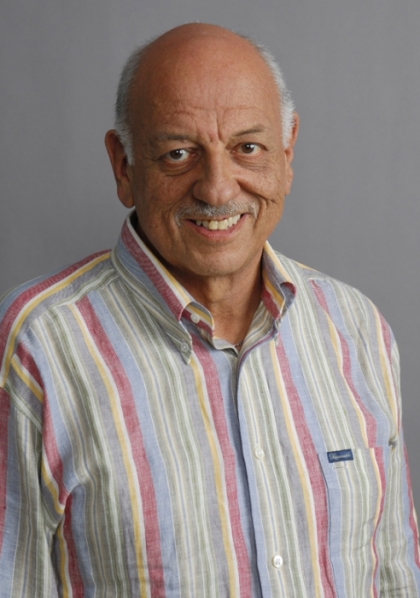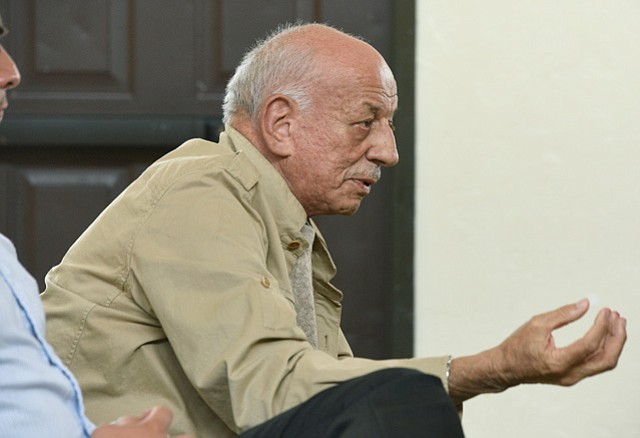Casas, a graduate of the School of Education’s counseling psychology program, retired from the University of California, Santa Barbara as one of the senior Chicano professors in the UC system. A pioneer in multicultural counseling, he helped establish the American Psychological Association’s first standing committee on racial and ethnic minorities. Of his many activist efforts on behalf of Latinos, he’s proudest of his work to ensure that undocumented immigrant families and children in Santa Barbara County have access to needed services including county mental health services.
I never in my life thought I would go to Stanford. But things happened.
I grew up in Rodeo, a small town off San Pablo Bay. Dad was a welder. We came from Mexico in 1945 when I was three years old. We weren’t destitute, but we sure didn’t have money to send me away to school. As an undergraduate I went to UC Berkeley, starting in 1959. It was an hour and a half or two hours each way on the Greyhound bus, a long awful commute for four years.
I was going to go into international relations. At the time, Berkeley had the best political science department in the world. But I was told I’d have to wait 10 years after my naturalization to get into the Foreign Service.
So I went into teaching.
All the birds with the broken wings gravitated to my office somehow. All the hard-core kids. Born to be “losers” because of family and life circumstances into which they were born. I began taking counseling courses.
I was driving home from work one day in 1969, listening to Spanish-language radio. An assistant to the Stanford president, Luis Nogales, was being interviewed. He said, “We need more Latinos at Stanford.” The university was just awakening to the notion that there are people of color in the world. He said, on the air, “Call me.”
The following morning I did. I said, “You offered me the opportunity to go to Stanford and I’m going to take you up on the offer.”
Into the masters counseling program I went, working with John Krumboltz and Carl Thoresen. Like most students in the program, I had a very limited psychology background. And I am pretty sure I was the first Latino admitted into the program.

University of California, Santa Barbara
I told them, “I want to work with Latino students. I’ll find a way. I know my people and I know my history. Give me the basic methodology with which I can do the work using the science-practitioner model that you’re developing.”
I really liked Stanford. We had some good camaraderie. I felt at home at Stanford even though there weren’t very many like me. There was warmth and support there from which you could draw and develop yourself.
I told John Krumboltz, “I’m not going to be the world’s greatest researcher, but at least I can help develop programs for the outreach and maintenance of racial/ethnic minority students. To increase the number of minorities who take advantage of higher education.”
Stanford allowed me, within the context of learning the materials, the freedom.
After completing my masters, I decided I wanted to go on for the PhD so as to have greater latitude to pursue my life goals. Krumboltz told me, “Get out of here for a year or so. Do hands-on work with the kind of people you want to work with. I’ll save you a slot.” So I got a job at Laney College in downtown Oakland. This was in the days of the Black Panthers. We were not the enemy, but we were not doing as much as should be done for the people who lived in Oakland. So every once in a while the Black Panthers would close the campus and lock us up in the “tower.”
I had great experiences getting locked up in the tower. I have nothing but good things to say about the Black Panthers in regards their treatment. I’m not saying it in a negative way. It needed to be done. And it needs to be done again. We need more grassroots activist organizations that effectively address the social injustices and inequities that continue to exist in this country.
I was the first Latino in the doctoral program in counseling psychology. There were several of us, however, in the School of Education. Five or six of us were Ford Foundation fellows. Stanford would stand out in the number of Latinos it admitted, thanks to this Ford support. Some worked in educational psychology. Some worked in child development. Some worked in statistics. Some worked in counseling. Some worked in history. We had a few in every major area in the SUSE and that was very helpful for all of us.
It’s not my research that’s most important to me. I had to do that to keep my job. In retrospect, I would say that I was fairly successful in my overall academic pursuits. My gratification was and is helping my students, or the little kid who is not getting proper mental health services, or the elderly. My ability to represent them, to do what needs to be done, to talk on their behalf, to write about things, to publish them … Things people tell me have resulted in positive outcomes that might otherwise have been ignored.
I’ve been able to break new barriers even when I got my hands slapped by chancellors … If you ask for permission, they’re going to say no … BUT if you believe you’re standing on firm ground, and you should know that as you put yourself together, you take those steps. You move it.
It used to be that when you went to the county for mental health care – most undocumented people don’t have health insurance – and if you looked a certain way, the next question was merely to get enough information to say, “I’m sorry, we can’t serve you.” We were able to stop that practice. I said, Look at state law. You have to give services to those who have the most need, whose symptoms are most severe.
My advice to young students: Do not get co-opted by the system. Too many young people I encounter are so brainwashed about thinking that you have to publish six or seven articles a year and they must be in these journals and you must be writing about these topics and you must be bringing in these grants.
If you think this way, you’ve already lost your focus. What could have been an original piece that could have served people very well will now sit in a library and gather dust.
If you have a goal, try to manage your career and your life planning that will enable you to do what you want to do. Do not repackage yourself to go for a higher price.
Keep your sense of self. Keep your sense of dignity. Keep your pride, please, as an ethnic person. Do not give it up.
-- Barbara Wilcox
Top photo: Paul Wellman/Santa Barbara Independent
